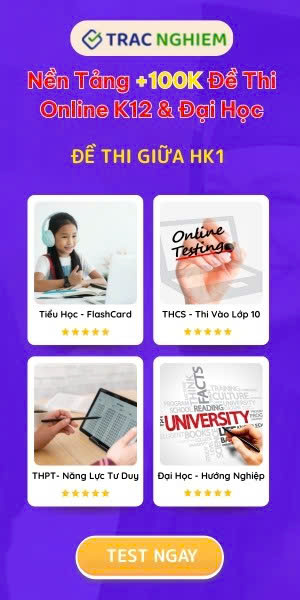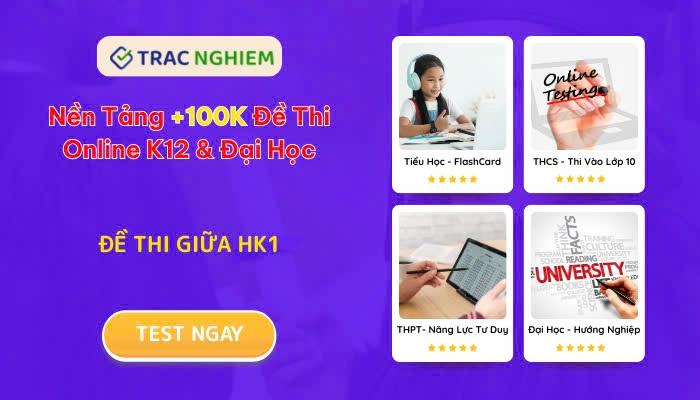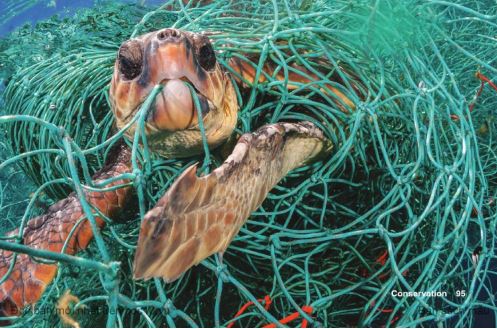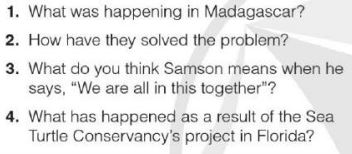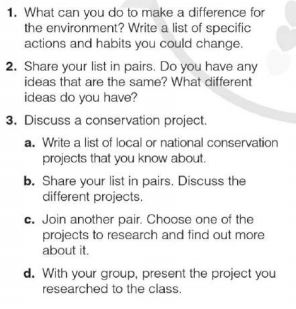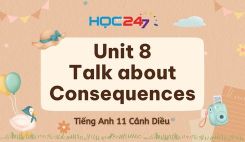Việc đánh bắt cá một cách quá mức cũng như việc vứt rác bừa bãi vào môi trường biển là một trong những hiểm họa khôn lường đến môi trường nước. Để giúp các em hiểu rõ hơn những tác hại và hậu quả mà nó mang lại, HOC247 mời các em tham khảo nội dung bài học Unit 8 - Discuss Conversation Projects thông qua nội dung bài đọc hiểu Making a difference. Chúc các em học vui!
Tóm tắt bài
1.1. Unit 8 lớp 11 Reading Task A
Look at the photo. What do you think the article will tell you? Write your ideas.
(Nhìn vào bức hình. Bạn nghĩ bài báo sẽ nói gì với bạn? Viết ý tưởng của bạn)
Guide to answer
The article is likely to talk about the positive impact that individuals can have on the environment, despite the negative effects of human actions. It will discuss two examples of people making a difference - a fisherman named Samson in Madagascar who is helping his community take better care of local waters by changing fishing practices to be more sustainable, and the Sea Turtle Conservancy organization in Florida, which started the "Where are the straws?" project to reduce the use of single-use plastics that are harmful to ocean wildlife. The article may emphasize that small actions can lead to significant changes in our own communities and inspire readers to take responsibility for protecting the environment.
Tạm dịch
Bài báo có thể sẽ nói về tác động tích cực mà các cá nhân có thể gây ra đối với môi trường, bất chấp những tác động tiêu cực do hành động của con người gây ra. Hội thảo sẽ thảo luận về hai ví dụ về những người tạo ra sự khác biệt - một ngư dân tên Samson ở Madagascar đang giúp cộng đồng của mình chăm sóc tốt hơn các vùng nước địa phương bằng cách thay đổi các phương pháp đánh bắt cá để bền vững hơn và tổ chức Bảo tồn Rùa biển ở Florida, tổ chức đã bắt đầu " Ống hút ở đâu?” dự án giảm thiểu việc sử dụng nhựa dùng một lần có hại cho động vật hoang dã ở đại dương. Bài viết có thể nhấn mạnh rằng những hành động nhỏ có thể dẫn đến những thay đổi đáng kể trong cộng đồng của chúng ta và truyền cảm hứng cho người đọc về trách nhiệm bảo vệ môi trường.
1.2. Unit 8 lớp 11 Reading Task B
What do you think overfishing means? Discuss in pairs.
(Bạn nghĩ đánh bắt quá mức có nghĩa là gì? Thảo luận theo cặp)
Guide to answer
Overfishing is when fish are caught from the ocean at a faster rate than they can reproduce, causing a decline in their population. This can lead to a shortage of fish, affecting the food chain and the livelihoods of people who depend on fishing for their income. Overfishing can also harm the environment, as it can disrupt the balance of marine ecosystems and cause the depletion of other species that rely on the fish for food.
(Đánh bắt quá mức là khi cá bị đánh bắt từ đại dương với tốc độ nhanh hơn khả năng sinh sản của chúng, gây ra sự suy giảm dân số. Điều này có thể dẫn đến tình trạng thiếu cá, ảnh hưởng đến chuỗi thức ăn và sinh kế của những người phụ thuộc vào đánh bắt cá để có thu nhập. Đánh bắt quá mức cũng có thể gây hại cho môi trường vì nó có thể phá vỡ sự cân bằng của hệ sinh thái biển và gây ra sự cạn kiệt của các loài khác sống dựa vào cá để làm thức ăn.)
1.3. Unit 8 lớp 11 Reading Task C
Read the article. Circle the main idea.
(Đọc bài báo. Khoanh tròn ý chính)
Guide to answer
The main idea is “We need to protect the oceans.” (Chúng ta cần bảo vệ các đại dương.)
1.4. Unit 8 lớp 11 Reading Task D
Work in pair.
(Làm việc theo cặp.)
Guide to answer
1. A fisherman named Samson and the other fishermen realized that they were overfishing.
2. They shouldn't catch so many young fish because if there are too few of them in the ocean, there won't be enough adult fish to reproduce.
3. We can do it togther.
4. So, the STC started the project “Where are the straws?” asking local restaurants to stop giving customers straws with their drinks. Now, many restaurants will only give straws if customers ask for them, and the straws they do give out are paper, not plastic.
Tạm dịch
1. Một ngư dân tên Samson và những ngư dân khác nhận ra rằng họ đang đánh bắt quá mức.
2. Không nên bắt quá nhiều cá con vì nếu có quá ít cá con ở đại dương thì sẽ không có đủ cá trưởng thành để sinh sản.
3. Chúng ta có thể làm điều đó cùng nhau.
4. Vì vậy, STC đã bắt đầu dự án “Ống hút ở đâu?” yêu cầu các nhà hàng địa phương ngừng tặng ống hút cho đồ uống của khách hàng. Hiện nay, nhiều nhà hàng chỉ tặng ống hút nếu khách hàng yêu cầu và ống hút họ phát là giấy chứ không phải nhựa.
GOAL CHECK
Describe one of the situations in the box to a partner. Use adverbs of manner and linking verbs.
(Mô tả một trong những tình huống trong hộp cho một đối tác. Sử dụng trạng từ chỉ cách thức và liên kết động từ)
Guide to answer
1. Specific actions and habits to make a difference for the environment may include:
Reduce plastic use: Use reusable bags, water bottles, and containers instead of single-use plastic ones.
Conserve water: Turn off the tap while brushing teeth or washing hands, take shorter showers, fix leaky faucets.
Conserve energy: Turn off lights and unplug electronics when not in use, use energy-efficient light bulbs.
Reduce meat consumption: Eating less meat can reduce greenhouse gas emissions and save water.
Use eco-friendly products: Choose products that are eco-friendly, biodegradable, and non-toxic.
Support local farmers: Buy locally grown food to reduce the carbon footprint of transportation.
2. Some local and national conservation projects in Vietnam:
GreenViet: A non-governmental organization (NGO) based in Da Nang that focuses on protecting endangered species, conserving biodiversity, and promoting environmental education.
Save Vietnam's Wildlife: An NGO based in Cuc Phuong National Park that rescues and rehabilitates animals, especially pangolins and other endangered species.
Vietnam Marine Turtle Conservation Project: A collaboration between the government and NGOs to protect sea turtles and their habitats in Vietnam.
Vietnam Forests and Deltas Project: A joint initiative between the Vietnamese government and the World Bank to promote sustainable forestry and reduce deforestation in the Mekong Delta.
WWF Vietnam: The Vietnamese branch of the World Wide Fund for Nature (WWF), which focuses on conservation of endangered species, climate change mitigation, and sustainable use of natural resources.
Mekong River Commission: A regional organization that aims to promote sustainable development and management of the Mekong River Basin, which includes Vietnam.
Caring for the environment is everyone's responsibility: A national campaign initiated by the Vietnamese government to raise awareness about environmental issues and encourage citizens to take action to protect the environment.
Tạm dịch
1. Những hành động, thói quen cụ thể nhằm tạo ra sự khác biệt cho môi trường có thể bao gồm:
Giảm sử dụng đồ nhựa: Sử dụng túi, chai nước và hộp đựng có thể tái sử dụng thay vì đồ nhựa dùng một lần.
Tiết kiệm nước: Tắt vòi khi đánh răng hoặc rửa tay, tắm ngắn hơn, sửa vòi nước bị rò rỉ.
Tiết kiệm năng lượng: Tắt đèn và rút phích cắm các thiết bị điện tử khi không sử dụng, sử dụng bóng đèn tiết kiệm điện.
Giảm tiêu thụ thịt: Ăn ít thịt có thể giảm phát thải khí nhà kính và tiết kiệm nước.
Sử dụng sản phẩm thân thiện với môi trường: Hãy chọn những sản phẩm thân thiện với môi trường, có khả năng phân hủy sinh học và không độc hại.
Hỗ trợ nông dân địa phương: Mua thực phẩm được trồng tại địa phương để giảm lượng khí thải carbon trong quá trình vận chuyển.
2. Một số dự án bảo tồn cấp địa phương và quốc gia ở Việt Nam:
Green Viet: Một tổ chức phi chính phủ (NGO) có trụ sở tại Đà Nẵng tập trung vào việc bảo vệ các loài có nguy cơ tuyệt chủng, bảo tồn đa dạng sinh học và thúc đẩy giáo dục môi trường.
Save Vietnam's Wildlife: Một tổ chức phi chính phủ có trụ sở tại Vườn quốc gia Cúc Phương chuyên cứu hộ và phục hồi động vật, đặc biệt là tê tê và các loài có nguy cơ tuyệt chủng khác.
Dự án Bảo tồn Rùa biển Việt Nam: Sự hợp tác giữa chính phủ và các tổ chức phi chính phủ nhằm bảo vệ rùa biển và môi trường sống của chúng ở Việt Nam.
Dự án Rừng và Đồng bằng Việt Nam: Một sáng kiến chung giữa Chính phủ Việt Nam và Ngân hàng Thế giới nhằm thúc đẩy lâm nghiệp bền vững và giảm nạn phá rừng ở Đồng bằng sông Cửu Long.
WWF Việt Nam: Chi nhánh Việt Nam của Quỹ Thiên nhiên Thế giới (WWF), tập trung vào bảo tồn các loài có nguy cơ tuyệt chủng, giảm thiểu biến đổi khí hậu và sử dụng bền vững tài nguyên thiên nhiên.
Ủy ban sông Mê Kông: Một tổ chức khu vực nhằm thúc đẩy phát triển và quản lý bền vững lưu vực sông Mê Kông, trong đó có Việt Nam.
Chăm sóc môi trường là trách nhiệm của mọi người: Một chiến dịch quốc gia do chính phủ Việt Nam khởi xướng nhằm nâng cao nhận thức về các vấn đề môi trường và khuyến khích người dân hành động để bảo vệ môi trường.
Bài tập minh họa
Answer the questions (Trả lời các câu hỏi sau)
In spring 2008, the polar bear was placed on the endangered species list. According to the USA's Endangered Species Act, an endangered species is an animal, plant or any other kind of wildlife that is likely to face extinction in its natural habitat. Polar bears had already been categorized as a "threatened" species which the ESA defines as one that is likely to become "endangered" in the foreseeable future.
The polar bear is the first animal that has been classified as endangered due primarily to global warming. Global warming is a form of climate change caused by increased levels of carbon dioxide and other greenhouse gases that become trapped in the atmosphere. Oil and gas heaters, engines using oil or petrol (or gasoline) and coal-powered electricity plants all require fossil fuels that lead to global warming. Renewable energy sources or renewables that don't cause global warming include solar, wind and hydro-electricity power. These alternative forms of power, as well as the science of climate change, have been strongly attacked by many of the world's biggest companies in order to protect the huge profits they make from fossil fuels. They do this even though they're fully aware of how much fossil fuels are damaging our planet and endangering many of the species we share it with.
1. Why was the polar bear placed on the endangered species list in spring 2008?
2. What is the primary cause of the polar bear being classified as endangered?
3. What are some renewable energy sources mentioned as alternatives to fossil fuels in the passage?
Key (Đáp án)
1. The polar bear was placed on the endangered species list in spring 2008 because it was deemed likely to face extinction in its natural habitat, meeting the criteria set by the USA's Endangered Species Act.
2. The primary cause of the polar bear being classified as endangered is global warming, which is primarily driven by increased levels of carbon dioxide and other greenhouse gases in the atmosphere, leading to the loss of their natural habitat.
3. Some renewable energy sources mentioned as alternatives to fossil fuels are solar power, wind power, and hydro-electricity. These sources do not contribute to global warming and are thus considered more environmentally friendly options.
Luyện tập
3.1. Kết luận
Qua bài học này, các em sẽ ghi nhớ các kiến thức từ vựng như sau:
- community: cộng đồng
- organization: tổ chức
- stuck: mắc kẹt
3.2. Bài tập trắc nghiệm Unit 8 - Ask Questions to Get More Information
Như vậy là các em đã xem qua bài giảng phần Unit 8 - Discuss Conversation Projectschương trình Tiếng Anh lớp 11 Cánh diều. Để củng cố kiến thức bài học mời các em tham gia bài tập trắc nghiệm Trắc nghiệm Unit 8 lớp 11 Cánh diều Discuss Conversation Projects.
Câu 4-10: Mời các em đăng nhập xem tiếp nội dung và thi thử Online để củng cố kiến thức về bài học này nhé!
Hỏi đáp Unit 8 - Discuss Conversation ProjectsTiếng Anh 8
Trong quá trình học tập nếu có thắc mắc hay cần trợ giúp gì thì các em hãy comment ở mục Hỏi đáp, Cộng đồng Tiếng Anh HOC248 sẽ hỗ trợ cho các em một cách nhanh chóng!
Chúc các em học tập tốt và luôn đạt thành tích cao trong học tập!
-- Mod Tiếng Anh 11 HỌC247

